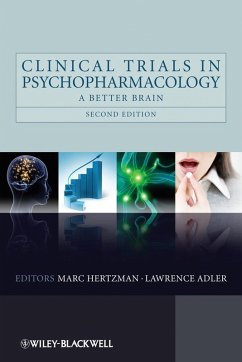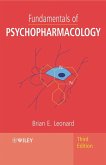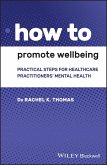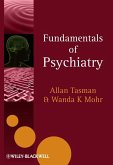Clinical Trials in Psychopharmacology (eBook, PDF)
A Better Brain
Redaktion: Hertzman, Marc; Adler, Lawrence


Alle Infos zum eBook verschenken

Clinical Trials in Psychopharmacology (eBook, PDF)
A Better Brain
Redaktion: Hertzman, Marc; Adler, Lawrence
- Format: PDF
- Merkliste
- Auf die Merkliste
- Bewerten Bewerten
- Teilen
- Produkt teilen
- Produkterinnerung
- Produkterinnerung

Hier können Sie sich einloggen

Bitte loggen Sie sich zunächst in Ihr Kundenkonto ein oder registrieren Sie sich bei bücher.de, um das eBook-Abo tolino select nutzen zu können.
Although clinical trials were virtually unheard of in psychiatry for many years, they are now the gold standard for judging whether drugs are safe and useful. But should they be? What is the true status of clinical trials? Even when they ostensibly demonstrate a benefit of a certain treatment, the strict patient selection criteria, poor compliance and high drop-out rate leave the conclusions open to question. Are the new treatments really better or more cost-effective than the old? Do they have fewer side effects? In this book the authors take a critical look at recent developments and present…mehr
- Geräte: PC
- mit Kopierschutz
- eBook Hilfe
- Größe: 3.33MB
![The Use and Misuse of Psychiatric Drugs (eBook, PDF) The Use and Misuse of Psychiatric Drugs (eBook, PDF)]() Joel ParisThe Use and Misuse of Psychiatric Drugs (eBook, PDF)45,99 €
Joel ParisThe Use and Misuse of Psychiatric Drugs (eBook, PDF)45,99 €![Fundamentals of Psychopharmacology, 3d Edition (eBook, PDF) Fundamentals of Psychopharmacology, 3d Edition (eBook, PDF)]() Brian E. LeonardFundamentals of Psychopharmacology, 3d Edition (eBook, PDF)68,99 €
Brian E. LeonardFundamentals of Psychopharmacology, 3d Edition (eBook, PDF)68,99 €![Mental Health Nursing at a Glance (eBook, PDF) Mental Health Nursing at a Glance (eBook, PDF)]() Grahame SmithMental Health Nursing at a Glance (eBook, PDF)22,99 €
Grahame SmithMental Health Nursing at a Glance (eBook, PDF)22,99 €![The Psychiatric Interview (eBook, PDF) The Psychiatric Interview (eBook, PDF)]() Allan TasmanThe Psychiatric Interview (eBook, PDF)59,99 €
Allan TasmanThe Psychiatric Interview (eBook, PDF)59,99 €![Child and Adolescent Behavioral Health (eBook, PDF) Child and Adolescent Behavioral Health (eBook, PDF)]() Child and Adolescent Behavioral Health (eBook, PDF)88,99 €
Child and Adolescent Behavioral Health (eBook, PDF)88,99 €![How to Promote Wellbeing (eBook, PDF) How to Promote Wellbeing (eBook, PDF)]() Rachel K. ThomasHow to Promote Wellbeing (eBook, PDF)30,99 €
Rachel K. ThomasHow to Promote Wellbeing (eBook, PDF)30,99 €![Fundamentals of Psychiatry (eBook, PDF) Fundamentals of Psychiatry (eBook, PDF)]() Allan TasmanFundamentals of Psychiatry (eBook, PDF)65,99 €
Allan TasmanFundamentals of Psychiatry (eBook, PDF)65,99 €-
-
-
Dieser Download kann aus rechtlichen Gründen nur mit Rechnungsadresse in A, B, BG, CY, CZ, D, DK, EW, E, FIN, F, GR, HR, H, IRL, I, LT, L, LR, M, NL, PL, P, R, S, SLO, SK ausgeliefert werden.
- Produktdetails
- Verlag: John Wiley & Sons
- Seitenzahl: 406
- Erscheinungstermin: 1. März 2010
- Englisch
- ISBN-13: 9780470749173
- Artikelnr.: 37299130
- Verlag: John Wiley & Sons
- Seitenzahl: 406
- Erscheinungstermin: 1. März 2010
- Englisch
- ISBN-13: 9780470749173
- Artikelnr.: 37299130
Care Environment and Medications. 1. FDA Reform Déjà vu Encore (John J.
Cohrssen). 1.1 Introduction. 1.2 The 1992 prescription drug user fee act
adds funds and changes FDA's focus. 1.3 PDUFA shortens drug review times
and eliminates the drug lag. 1.4 PDUFA timetables feed safety concerns. 1.5
FDA responds to safety concerns. 1.6 The pipeline problem. 1.7 The 2007 FDA
Science Board's Subcommittee on Science and Technology report. 1.8 The
FDAAA of 2007 reauthorize PDUFA and provide new authority to address safety
and the critical path initiative. 1.9 The impact of PDFUA on FDA. 1.10
Comparative medical benefits, comparative effectiveness and FDA. 1.11 FDA
and non-inferiority trials. 1.12 FDA and CMS decisions on medicare
coverage. 1.13 Preemption: FDA's role in relation to liability litigation
in state courts. 1.14 FDA's exclusivity in allowing access to experimental
drugs. 1.15 Conclusions. 2. Do Antidepressants Cause Suicide (Marc
Hertzman). 2.1 Some definitional problems. 2.2 A brief history of the
concerns of suicidality caused by antidepressants. 2.3 Politics rears its
ugly head. 2.4 The FDA responds to fear of its own shadow. 2.5 What changes
in public policy wrought. 2.6 A funny thing happened on the way to the
forum. 2.7 Meanwhile back at the ranch. 2.8 Moral (maybe). 3. The Genome,
Genes and Brain - Tailored Drugs (Lawrence Adler). 3.1 Introduction. 3.2
Issues in new drug development. 3.3 Early development of psychiatric
pharmaceutical entities. 3.4 Advances in research technology. 3.5 Review of
genetics. 3.6 Activation of genes by signal transduction cascades. 3.7 The
human genome. 3.8 The sequencing of the genome. 3.9 DNA variation. 3.10
Genes and illness. 3.11 Genomic findings, potential targets and new drug
development. 3.12 Conclusion . 4. Patenting and Licensing Concerns in
Psychiatric Genetics (Jorge A. Goldstein and Karen R. Markowicz). 4.1
Genetic diagnoses in psychiatry. 4.2 The evolving patent landscape in
psychiatry. 4.3 Approaches to solving potential problems. 4.4 Conclusions.
5. Women's Issues in Clinical Trials (Mary Seeman). 5.1 History. 5.2
Perceived advantages of excluding women. 5.3 Change in perspective. 5.4
Have things changed?. 5.5 Progress since 1993. 5.6 Reported current
difficulties in including women. 5.7 Contraception in clinical trials. 5.8
Drugs in lactating women. 5.9 How often do women take drugs during
pregnancy?. 5.10 Ethical issues: risk/benefit analysis. 5.11 Adequate
information. 5.12 Adolescent women. 5.13 Recruitment and retention of
women. SECTION II Clinical Trials and Mood Disorders. 6. Issues and Clues
in the Pharmacological Treatment of Mood Disorders (F. Jollant, A Ionita
and P Courtet). 6.1 What do we know about mood disorders that may be
relevant for their pharmacological treatment?. 6.2 Are there clues for the
pharmacological treatment of mood disorders?. 6.3 Perspectives. 7. Bipolar
Disorder (A. Bochetta). 7.1 Trials in acute mania. 7.2 Trials in acute
bipolar depression. 7.3 Trials in maintenance of bipolar disorder. 7.4 What
is a mood stabilizer?. 7.5 What controlled trials cannot tell us about
treatment of bipolar disorder. 8. Special Issues of Research Methodology in
Bipolar Disorder Clinical Treatment Trials (R. M. Post). 8.1 Introduction.
8.2 Efficacy-effectiveness gap. 8.3 Trials for drug registration versus
those that are most clinically informative. 8.4 Needed for designs that
more optimally inform clinical practice. 8.5 'Hidden' high degrees of
treatment resistance. 8.6 Controversy about optimal designs and rating
instruments. 8.7 The traditional RCT is expensive, cumbersome and prone to
failure. 8.8 Alternative designs for pilot and proof of principle efficacy
studies. 8.9 Statistical analysis of N-of-1 trials. 8.10 Statistical
approaches to estimating necessary trial durations in individual patients.
8.11 Crossover trials for enhancing clinical informatics and statistical
power. 8.12 Carryover effects. 8.13 Long-term trend for understudy of
bipolar disorder compared to other major mental disorders. 8.14 Parallel
and pressing design issues for childhood-onset bipolar illness. 8.15
Contradictory balance between inclusiveness (for generalizability) and
homogeneity (for efficacy). 8.16 Assessing moderators and mediators. 8.17
Conclusions and implications. 9. The Utility of Low-dose Antidepressants
(Monica L. Zilberman, Clarice Gorenstein and Valentim Gentil). 9.1
Introduction. 9.2 Low dose antidepressants for chief indications. 9.3
Antidepressant use for other indications. 9.4 Emotion regulation in healthy
individuals. 9.5 Conclusion. SECTION III Clinical Trials in Anxiety and
Other Disorders. 10. Clinical Trials for Anxiety Disorders (Marco Mula and
Gionata Strigaro). 10.1 Introduction. 10.2 Methodological issues in
treatment research for anxiety disorders. 10.3 Panic disorder with/without
agoraphobia. 10.4 Generalized anxiety disorder. 10.5 Social anxiety
disorder. 10.6 Post-traumatic stress disorder. 10.7 Conclusions. 11.
Pharmacological Trials for the Treatment of Substance Use Disorders (Lisa
J. Merlo, Julia Arana and Amanda M. Stone). 11.1 Psychopharmacological
trials for the treatment of substance use disorder. 11.2 Definitions of
substance use disorders. 11.3 Introduction to psychopharmacotherapy for
SUD. 11.4 Considerations in pharmacotherapy trials for SUDs. 11.5
Conclusions and future directions. 12. Clinical Psychopharmacology of
Patients with Eating Disorders (James E Mitchell, Kristine Steffen, Scott
Engel, Ross Crosby and James Roerig). 12.1 Introduction. 12.2 Diagnostic
issues. 12.3 Methodological/statistical issues. 12.4 Pharmacotherapy
trials. 12.5 Pharmacotherapy/psychotherapy combined trials. 12.6 Summary.
13. ADHD Clinical Trials (Anne Childress). 13.1 Introduction. 13.2
Lisdexamfetamine (Vyvanse). 13.3 Methylphenidate transdermal system
(Daytrana). 13.4 Dexmethylphenidate (Focalin). 13.5 Dexmethylphenidate
extended release (Focalin XR). 13.6 Atomoxetine (Strattera). 13.7 Extended
release methylphenidate (Ritalin LA). 13.8 Modified release methylphenidate
(Metadate CD). 13.9 Mixed amphetamine salts extended release (Adderall XR).
13.10 OROS methylphenidate (Concerta). 13.11 Guanfacine extended release.
13.12 SPD465. 13.13 Modafinil. 13.14 Bupropion XL. 13.15 Discussion. 14.
Autism and Asperger's Spectrum Disorders (Marc Hertzman). 14.1
Introduction. 14.2 Individual entities versus a spectrum disorder. 14.3
Recent psychopharmacological approaches to autism and Asperger's spectrum
disorders. 14.4 Recapitulation. 15. Pharmacological Treatments of Impulse
Control Disorders (Helga Myrseth and Ståle Pallesen). 15.1 Impulse control
disorders. 15.2 Pathological gambling. 15.3 Trichotillomania. 15.4
Kleptomania. 15.5 Pyromania. 15.6 Intermittent explosive disorder. 15.7
Conclusions. SECTION IV Special Issues in Psychopharmacology. 16. Potential
Benefits of Herbal Medicine for Schizophrenia: from Empirical Observations
to Clinical Trials (Zhang-Jin Zhang, Qing-Rong Tan, Xue-Chu Zhen and Yao
Tong). 16.1 Potential benefits of herbal medicine used in the treatment of
schizophrenia. 16.2 Possible psychopharmacological mechanisms of herbal
actions. 16.3 Search strategies for herbal agents having antischizophrenic
potentials. 16.4 Specific issues in the conduct of herbal medicine trials
in schizophrenia. 16.5 Conclusions. 17. Adverse Effects of Antipsychotics
(Pierre Landry, Anne-Marie Rousseau, and Leila Skalli). 17.1 Introduction.
17.2 Pharmacology of adverse events. 17.3 Discontinuation symptoms. 17.4
Conclusion. 18. Meta Musings on Methodology (Marc Hertzman). 18.1
Criticisms of assumptions about clinical trials methodology. 18.2 Thoughts
on alternative study designs. 18.3 Conclusion: standardization can be
stultifying. Index.
Care Environment and Medications. 1. FDA Reform Déjà vu Encore (John J.
Cohrssen). 1.1 Introduction. 1.2 The 1992 prescription drug user fee act
adds funds and changes FDA's focus. 1.3 PDUFA shortens drug review times
and eliminates the drug lag. 1.4 PDUFA timetables feed safety concerns. 1.5
FDA responds to safety concerns. 1.6 The pipeline problem. 1.7 The 2007 FDA
Science Board's Subcommittee on Science and Technology report. 1.8 The
FDAAA of 2007 reauthorize PDUFA and provide new authority to address safety
and the critical path initiative. 1.9 The impact of PDFUA on FDA. 1.10
Comparative medical benefits, comparative effectiveness and FDA. 1.11 FDA
and non-inferiority trials. 1.12 FDA and CMS decisions on medicare
coverage. 1.13 Preemption: FDA's role in relation to liability litigation
in state courts. 1.14 FDA's exclusivity in allowing access to experimental
drugs. 1.15 Conclusions. 2. Do Antidepressants Cause Suicide (Marc
Hertzman). 2.1 Some definitional problems. 2.2 A brief history of the
concerns of suicidality caused by antidepressants. 2.3 Politics rears its
ugly head. 2.4 The FDA responds to fear of its own shadow. 2.5 What changes
in public policy wrought. 2.6 A funny thing happened on the way to the
forum. 2.7 Meanwhile back at the ranch. 2.8 Moral (maybe). 3. The Genome,
Genes and Brain - Tailored Drugs (Lawrence Adler). 3.1 Introduction. 3.2
Issues in new drug development. 3.3 Early development of psychiatric
pharmaceutical entities. 3.4 Advances in research technology. 3.5 Review of
genetics. 3.6 Activation of genes by signal transduction cascades. 3.7 The
human genome. 3.8 The sequencing of the genome. 3.9 DNA variation. 3.10
Genes and illness. 3.11 Genomic findings, potential targets and new drug
development. 3.12 Conclusion . 4. Patenting and Licensing Concerns in
Psychiatric Genetics (Jorge A. Goldstein and Karen R. Markowicz). 4.1
Genetic diagnoses in psychiatry. 4.2 The evolving patent landscape in
psychiatry. 4.3 Approaches to solving potential problems. 4.4 Conclusions.
5. Women's Issues in Clinical Trials (Mary Seeman). 5.1 History. 5.2
Perceived advantages of excluding women. 5.3 Change in perspective. 5.4
Have things changed?. 5.5 Progress since 1993. 5.6 Reported current
difficulties in including women. 5.7 Contraception in clinical trials. 5.8
Drugs in lactating women. 5.9 How often do women take drugs during
pregnancy?. 5.10 Ethical issues: risk/benefit analysis. 5.11 Adequate
information. 5.12 Adolescent women. 5.13 Recruitment and retention of
women. SECTION II Clinical Trials and Mood Disorders. 6. Issues and Clues
in the Pharmacological Treatment of Mood Disorders (F. Jollant, A Ionita
and P Courtet). 6.1 What do we know about mood disorders that may be
relevant for their pharmacological treatment?. 6.2 Are there clues for the
pharmacological treatment of mood disorders?. 6.3 Perspectives. 7. Bipolar
Disorder (A. Bochetta). 7.1 Trials in acute mania. 7.2 Trials in acute
bipolar depression. 7.3 Trials in maintenance of bipolar disorder. 7.4 What
is a mood stabilizer?. 7.5 What controlled trials cannot tell us about
treatment of bipolar disorder. 8. Special Issues of Research Methodology in
Bipolar Disorder Clinical Treatment Trials (R. M. Post). 8.1 Introduction.
8.2 Efficacy-effectiveness gap. 8.3 Trials for drug registration versus
those that are most clinically informative. 8.4 Needed for designs that
more optimally inform clinical practice. 8.5 'Hidden' high degrees of
treatment resistance. 8.6 Controversy about optimal designs and rating
instruments. 8.7 The traditional RCT is expensive, cumbersome and prone to
failure. 8.8 Alternative designs for pilot and proof of principle efficacy
studies. 8.9 Statistical analysis of N-of-1 trials. 8.10 Statistical
approaches to estimating necessary trial durations in individual patients.
8.11 Crossover trials for enhancing clinical informatics and statistical
power. 8.12 Carryover effects. 8.13 Long-term trend for understudy of
bipolar disorder compared to other major mental disorders. 8.14 Parallel
and pressing design issues for childhood-onset bipolar illness. 8.15
Contradictory balance between inclusiveness (for generalizability) and
homogeneity (for efficacy). 8.16 Assessing moderators and mediators. 8.17
Conclusions and implications. 9. The Utility of Low-dose Antidepressants
(Monica L. Zilberman, Clarice Gorenstein and Valentim Gentil). 9.1
Introduction. 9.2 Low dose antidepressants for chief indications. 9.3
Antidepressant use for other indications. 9.4 Emotion regulation in healthy
individuals. 9.5 Conclusion. SECTION III Clinical Trials in Anxiety and
Other Disorders. 10. Clinical Trials for Anxiety Disorders (Marco Mula and
Gionata Strigaro). 10.1 Introduction. 10.2 Methodological issues in
treatment research for anxiety disorders. 10.3 Panic disorder with/without
agoraphobia. 10.4 Generalized anxiety disorder. 10.5 Social anxiety
disorder. 10.6 Post-traumatic stress disorder. 10.7 Conclusions. 11.
Pharmacological Trials for the Treatment of Substance Use Disorders (Lisa
J. Merlo, Julia Arana and Amanda M. Stone). 11.1 Psychopharmacological
trials for the treatment of substance use disorder. 11.2 Definitions of
substance use disorders. 11.3 Introduction to psychopharmacotherapy for
SUD. 11.4 Considerations in pharmacotherapy trials for SUDs. 11.5
Conclusions and future directions. 12. Clinical Psychopharmacology of
Patients with Eating Disorders (James E Mitchell, Kristine Steffen, Scott
Engel, Ross Crosby and James Roerig). 12.1 Introduction. 12.2 Diagnostic
issues. 12.3 Methodological/statistical issues. 12.4 Pharmacotherapy
trials. 12.5 Pharmacotherapy/psychotherapy combined trials. 12.6 Summary.
13. ADHD Clinical Trials (Anne Childress). 13.1 Introduction. 13.2
Lisdexamfetamine (Vyvanse). 13.3 Methylphenidate transdermal system
(Daytrana). 13.4 Dexmethylphenidate (Focalin). 13.5 Dexmethylphenidate
extended release (Focalin XR). 13.6 Atomoxetine (Strattera). 13.7 Extended
release methylphenidate (Ritalin LA). 13.8 Modified release methylphenidate
(Metadate CD). 13.9 Mixed amphetamine salts extended release (Adderall XR).
13.10 OROS methylphenidate (Concerta). 13.11 Guanfacine extended release.
13.12 SPD465. 13.13 Modafinil. 13.14 Bupropion XL. 13.15 Discussion. 14.
Autism and Asperger's Spectrum Disorders (Marc Hertzman). 14.1
Introduction. 14.2 Individual entities versus a spectrum disorder. 14.3
Recent psychopharmacological approaches to autism and Asperger's spectrum
disorders. 14.4 Recapitulation. 15. Pharmacological Treatments of Impulse
Control Disorders (Helga Myrseth and Ståle Pallesen). 15.1 Impulse control
disorders. 15.2 Pathological gambling. 15.3 Trichotillomania. 15.4
Kleptomania. 15.5 Pyromania. 15.6 Intermittent explosive disorder. 15.7
Conclusions. SECTION IV Special Issues in Psychopharmacology. 16. Potential
Benefits of Herbal Medicine for Schizophrenia: from Empirical Observations
to Clinical Trials (Zhang-Jin Zhang, Qing-Rong Tan, Xue-Chu Zhen and Yao
Tong). 16.1 Potential benefits of herbal medicine used in the treatment of
schizophrenia. 16.2 Possible psychopharmacological mechanisms of herbal
actions. 16.3 Search strategies for herbal agents having antischizophrenic
potentials. 16.4 Specific issues in the conduct of herbal medicine trials
in schizophrenia. 16.5 Conclusions. 17. Adverse Effects of Antipsychotics
(Pierre Landry, Anne-Marie Rousseau, and Leila Skalli). 17.1 Introduction.
17.2 Pharmacology of adverse events. 17.3 Discontinuation symptoms. 17.4
Conclusion. 18. Meta Musings on Methodology (Marc Hertzman). 18.1
Criticisms of assumptions about clinical trials methodology. 18.2 Thoughts
on alternative study designs. 18.3 Conclusion: standardization can be
stultifying. Index.







